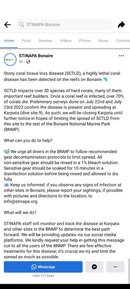scubbq
Registered
Spread the world as much as you can. On island, and already explaining to the average tourist diver, and they just don’t care. So upsetting.
Stony coral tissue loss disease (SCTLD), a highly lethal coral disease that has been impacting much of Florida since 2014 and the wider Caribbean since 2019, has been detected on the reefs in Bonaire. SCTLD impacts over 30 species of hard corals, many of them important reef builders, that comprise much of Bonaire’s reefs. Once a coral reef is infected, over 70% of corals die. This letter is meant to inform you of the steps STINAPA will be taking to document the extent and eventual spread of this coral disease. We will also advise you via this letter on actions you and your guests can take to help us slow the spread of SCTLD.
Preliminary surveys done on July 22nd and 23rd 2022 confirm the disease is present and spreading at Karpata (dive site 9). As such we will be closing Karpata until further notice in hopes of limiting the spread of SCTLD from this site to the rest of the Bonaire National Marine Park (BNMP). We urge all divers in the BNMP to follow recommended gear decontamination protocols to limit spread. All non- sensitive gear should be rinsed in a 1% bleach solution, sensitive gear should be soaked for 10 minutes in a disinfection solution before being rinsed and allowed to dry fully. These decontamination protocols can be found on AGRRA’s website using this link:
https://www.agrra.org/wp-content/uploads/2019/03/Florida-coral-disease-decontamination- protocol.pdf.
STINAPA staff will begin monitoring and tracking the disease at Karpata and other sites in the BNMP to determine the best path forward. If you or any of your guests observe any signs of infection at other sites in Bonaire, please report your sightings, if possible with pictures and directions to the location, to info@stinapa.org or submit a report via Coral Disease Outbreak - AGRRA.
In the coming days and weeks, we will be providing updates on the disease and mitigation efforts via our social media platforms. We kindly request your help in getting this message out to all the users of the BNMP and your guests in particular. There are few effective treatments for this disease; it’s crucial we try and limit the spread as much as possible.
We trust we have informed you sufficiently for now but if you have any questions and/or remarks, please do not hesitate to contact us. You can contact us per e-mail (info@stinapa.org) and/or per telephone (00599-7178444).
We thank you in advance for your help with spreading our message about SCTLD to users of the BNMP!
 dan.org
dan.org
Stony coral tissue loss disease (SCTLD), a highly lethal coral disease that has been impacting much of Florida since 2014 and the wider Caribbean since 2019, has been detected on the reefs in Bonaire. SCTLD impacts over 30 species of hard corals, many of them important reef builders, that comprise much of Bonaire’s reefs. Once a coral reef is infected, over 70% of corals die. This letter is meant to inform you of the steps STINAPA will be taking to document the extent and eventual spread of this coral disease. We will also advise you via this letter on actions you and your guests can take to help us slow the spread of SCTLD.
Preliminary surveys done on July 22nd and 23rd 2022 confirm the disease is present and spreading at Karpata (dive site 9). As such we will be closing Karpata until further notice in hopes of limiting the spread of SCTLD from this site to the rest of the Bonaire National Marine Park (BNMP). We urge all divers in the BNMP to follow recommended gear decontamination protocols to limit spread. All non- sensitive gear should be rinsed in a 1% bleach solution, sensitive gear should be soaked for 10 minutes in a disinfection solution before being rinsed and allowed to dry fully. These decontamination protocols can be found on AGRRA’s website using this link:
https://www.agrra.org/wp-content/uploads/2019/03/Florida-coral-disease-decontamination- protocol.pdf.
STINAPA staff will begin monitoring and tracking the disease at Karpata and other sites in the BNMP to determine the best path forward. If you or any of your guests observe any signs of infection at other sites in Bonaire, please report your sightings, if possible with pictures and directions to the location, to info@stinapa.org or submit a report via Coral Disease Outbreak - AGRRA.
In the coming days and weeks, we will be providing updates on the disease and mitigation efforts via our social media platforms. We kindly request your help in getting this message out to all the users of the BNMP and your guests in particular. There are few effective treatments for this disease; it’s crucial we try and limit the spread as much as possible.
We trust we have informed you sufficiently for now but if you have any questions and/or remarks, please do not hesitate to contact us. You can contact us per e-mail (info@stinapa.org) and/or per telephone (00599-7178444).
We thank you in advance for your help with spreading our message about SCTLD to users of the BNMP!
How Divers Can Help Combat Coral Disease
Divers can do their part to help ensure stony coral tissue loss disease does not spread and cause further destruction.





